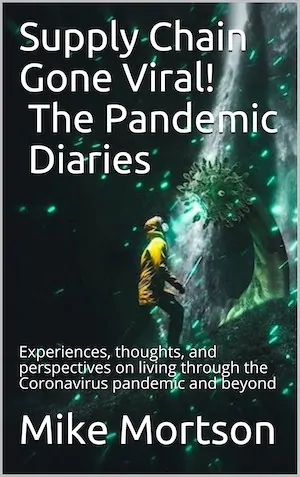
A year of dealing with the disruptions caused by the Coronavirus, combined with another tough year ahead, has created an environment of Pandemic fatigue of the highest order.
Children have had to stay at home instead of going to school. Adults have had to work from home, or worse yet, are at home because they either lost their jobs or had their work hours cut. Going to the store to get the basics has meant seeing empty shelves, long line ups, curb side pick up, mask mandates, and social distancing reminders everywhere.
Businesses have been closed, forced to reinvent their ways of going to market, and restructured just to cling on and hope for survival.
And even with the approval of vaccines the poor initial rollout suggests that it is going to be a long time yet before we can go back to some state of normal.
How many people have Post Pandemic Stress Disorder?
Post Pandemic Stress Disorder (PPSD) in Supply Chain
Healthcare workers have been the true heroes through this whole period. They work endlessly and tirelessly on the front lines of this battle to help save and protect all of us. It should not be surprising that anyone in the healthcare field would be experiencing a high level of stress and burnout.
Supply Chain professionals have also been under unprecedented levels of stress. First would be those involved in securing and ensuring supply of goods (eg. Personal Protective Equipment, or PPE, ventilators, and vaccines) for the hospitals, long term care homes, and other medical facilities.
Then there are those Supply Chain professionals who are involved in the supply of goods for food and household basics (eg. toilet paper) which are needed for our survival. On top of that are those who need to keep stores stocked and supply lines open of every shape and size. And finally there are those who have to fulfill and deliver all of those goods.
All of this has had to be done under immense pressure, with unwavering time constraints, under lockdown conditions, and under all social distancing and pandemic guidelines.
All the while the pandemic has been spreading with greater intensity, with more people becoming ill and dying, and the rest of us trying diligently to avoid the same fate.
This is compounded by the fact that there are those who refuse to do their part. The anti-maskers and the anti-vaxxers are risking the lives of not only themselves but of everyone else around them without remorse.
Since this has dragged on for over a year, with a long time to go still, the levels of pandemic fatigue as manifested by frustrations, expressed outwardly or held internally, have reached a fevered pitch.
What is Post Traumatic Stress Disorder?
Certainly the phrase “Post Pandemic Stress Disorder” is a play on the very real phrase “Post Traumatic Stress Disorder”. It is not mean to be disrespectful in any way but only to convey the association of this condition with the pandemic.
Post Traumatic Stress Disorder (PTSD) is defined as “is a mental disorder that can develop after a person is exposed to a traumatic event, such as sexual assault, warfare, traffic collisions, child abuse, or other threats on a person’s life” according to Wikipedia.
Wikipedia continues to say that “COVID-19 is affecting people’s social connectedness, their trust in people and institutions, their jobs and incomes, as well as imposing a huge toll in terms of anxiety and worry. COVID-19 public health mitigation measures (i.e., physical distancing, quarantine and isolation) can exacerbate loneliness, mental health symptoms, withdrawal symptoms and psychological trauma. Confinement rules, unemployment and fiscal austerity measures during and following the pandemic period can affect the illicit drug market and drug use patterns.”
It’s easy to understand how anyone, whether due to personal and/or professional circumstances, could have Post Traumatic, or rather Pandemic, Stress Disorder.
Reasons for PPSD in Supply Chain
The Mayo Clinic states the symptoms of Post Traumatic Stress Disorder to include: intrusive memories, avoidance, negative changes in thinking or mood, and changes in physical and emotional reactions.
In Supply Chain there are many job related reasons, or factors, that can drive someone to have Pandemic fatigue if not full Post Pandemic Stress Disorder. For our purpose here we are focussing job induced factors.
Here are a list of some pandemic induced reasons for this level of stress:
- Job loss
- Reduced work hours and/or pay
- Excessive hours, overtime, and 24-7 on-call availability
- No time off/vacation time
- Working from home and inability to separate work from family life
- Supplier lockdowns
- Supplier closures and bankruptcies
- Raw material inventory shortages
- Inadequacy of National Strategic Stockpiles
- Lack of visibility as to supply availability
- Finished good stock-outs
- Lack of positive cash flow
- Insufficient capacity to handle demand surges
- No logistics capacity
- Lack of a detailed, realistic disaster recovery plan
- Executive panic
- Lack of leadership
- No risk management skills
- Lack of customer distribution channel
- Non-compliance with social distancing guidelines
- No/limited Online/E-Commerce fulfillment capability
- Lack of skills
- …
Supply Chain by its very nature is a high paced, adrenaline infused, stress laden profession. Throw on top of that the stresses and strains that accompany a global pandemic and the stress levels can become overwhelming.
It’s critical to recognize if you are suffering under the strain and ensuring that you reach out for help.
Overcoming Post Pandemic Stress Disorder
The promise of overcoming the Coronavirus with the rollout of an ever increasing number of vaccines is essential to help us all get through this. But even that is not without its challenges as many people will either delay taking, if not outright refuse to take, the vaccine. That is further complicated with the delays and inevitable problems of global distribution of vaccines just to get it to people, let alone in their arms.
All of that means that we will be dealing with this pandemic in some measure for some time to come. So how do we get through this Post Pandemic Stress Disorder?
From a personal standpoint you should seek the help of qualified medical and psychological professionals. Don’t delay. There is no shame in seeking the help of others. We are all going through this in varying degrees.
From a business standpoint its important for Supply Chain professionals to enact both tactical and strategic measures to get through this situation.
Tactically it is important to enlist the support of all of your colleagues and external companies to provide the resources you need to handle the workload. A war room mentality and approach is necessary to ensure that everyone is focused and attacking the issues in a concerted and coordinated fashion.
Prioritization and risk-based decision making are required to sort through the myriad of issues and address what is most important first, putting lesser issues on the back burner for the short term.
Strategically the pandemic has shone a bright light on the importance of Supply Chain for the survival of every company and every economy. As such it is important to invest in your people and their development and training. They are the leaders that will determine whether your company survives, let alone thrives.
On top of that it is now important to develop the vision and strategy to create a more robust and resilient Supply Chain in the future. Implementing elements of a Digital Supply Chain, based on a backbone of real end to end electronic connectivity, will enable the real time visibility to manage every aspect of any Supply Chain quickly and effectively.
Conclusion
Pandemic fatigue has set in, at a very minimum. At the other extreme many people are suffering from Post Pandemic Stress Disorder.
You must get help. Reach out to others, communicate and share, and take steps to help you get through this.
In Supply Chain we are front and centre in this war against the Pandemic, second only to the front line Healthcare workers. Supply Chain is normally a stress riddled occupation. Throw a pandemic on top of that and the stress levels get even higher.
Recognize where you are in this environment and get the help you need. Unfortunately there is always another disaster around the corner so we need to be even more prepared for the next, inevitable catastrophe.

